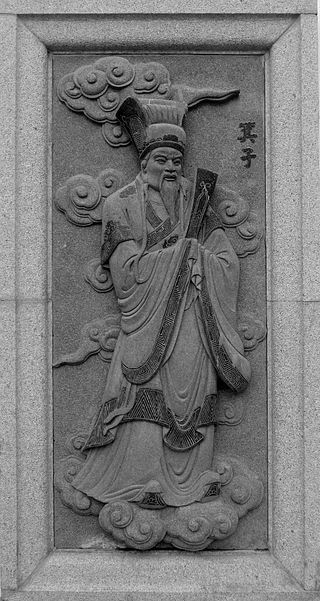
Jizi, Qizi, or Kizi was a semi-legendary Chinese sage who is said to have ruled Gija Joseon in the 11th century BCE. Early Chinese documents like the Book of Documents and the Bamboo Annals described him as a virtuous relative of the last king of the Shang dynasty who was punished for remonstrating with the king. After Shang was overthrown by Zhou in the 1040s BCE, he allegedly gave political advice to King Wu, the first Zhou king. Chinese texts from the Han dynasty onwards claimed that King Wu enfeoffed Jizi as ruler of Chaoxian. According to the Book of Han, Jizi brought agriculture, sericulture, and many other facets of Chinese civilization to Joseon. His family name was Zi/Ja (子) and given name was Xuyu/Suyu.

Samguk yusa or Memorabilia of the Three Kingdoms is a collection of legends, folktales and historical accounts relating to the Three Kingdoms of Korea, as well as to other periods and states before, during and after the Three Kingdoms period. "Samguk yusa is a historical record compiled by the Buddhist monk Il-yeon in 1281 in the late Goryeo Dynasty." It is the earliest extant record of the Dangun legend, which records the founding of Gojoseon as the first Korean nation. The Samguk yusa is National Treasure No. 306.

Gojoseon, contemporary name Joseon, was the first kingdom on the Korean Peninsula. According to Korean mythology, the kingdom was established by the legendary king Dangun. Gojoseon possessed the most advanced culture in the Korean Peninsula at the time and was an important marker in the progression towards the more centralized states of later periods. The addition of Go, meaning "ancient", is used in historiography to distinguish the kingdom from the Joseon dynasty, founded in 1392 CE.

Gimje is a city in North Jeolla Province, South Korea.

Taejo, personal name Yi Sŏng-gye, later Yi Tan, was the founder and first monarch of the Joseon period of Korea. After overthrowing the Goryeo period, he ascended to the throne in 1392 and abdicated six years later during a strife between his sons. He was honored as Emperor Go following the establishment of the Korean Empire. Taejo, personal name Yi Sŏng-gye, later Yi Tan, was the founder and first monarch of the Joseon dynasty of Korea. After overthrowing the Goryeo dynasty, he ascended to the throne in 1392 and abdicated six years later during a strife between his sons. He was honored as Emperor Go following the establishment of the Korean Empire. Taejo emphasized continuity over change. No new institutions were created, and no massive purges occurred during his reign. His new dynasty was largely dominated by the same ruling families and officials that had served the previous regime. He re-established amicable ties with Japan and improved relations with Ming China.

Ch'oe Yŏng, also romanized as Choi Young, was a Korean general born in Hongseong or Cheorwon during the Goryeo period. He became a national hero after he put down Cho Il-sin's Rebellion. He also participated in the Red Turban Rebellions and later allied with the Ming dynasty to overthrow the Mongol Yuan dynasty. In his final years, General Ch'oe was betrayed and executed by his former subordinate Yi Sŏng-gye, who founded the Joseon dynasty of Korea, bringing an end to the Goryeo period.

Ç

Goryeosa, or History of Goryeo, is an extensive historical record of the Goryeo dynasty, compiled by the officials of Goryeo's successor state, Joseon. Its compilation started during the reign of Taejo, was completed under Munjong, and was first printed under Danjong. Goryeosa consists of 139 volumes and stylistically follows Chinese historiography where sections are organized by their purpose. The section compiling the annals of the kings, sega narrates the history of Goryeo kings. The monograph section, ji, contains "accounts of the politics, economics, personnel, geography, astronomy, and other topics related to Goryeo society." The biographies section, yeoljeon, describes notable officials. The chronology section, yeonpyo lists the names of kings and their reigns. The listing section, mongnok, is the table of contents of the entire compilation.
Gongyang of Goryeo was the 34th and final ruler of the Goryeo Dynasty of Korea. He was the descendant of Duke Yangyang, brother of King Huijong. He was deposed by Yi Seong-gye, who then established the new Joseon Dynasty.
Kim Won-yong (1922–1993) was a South Korean archaeologist and art historian. Noted in the discipline of Korean archaeology and ancient art history, he was one of the first people recognized as an archaeologist in Korea to receive a Doctor of Philosophy degree.
The Korean Archaeological Society is a professional and scholarly association of archaeologists in South Korea. The Society publishes the peer-reviewed Journal of the Korean Archaeological Society. This journal is the South Korean equivalent of scholarly archaeological journals such as American Antiquity, Kaogu, Antiquity, and Kokogaku Kenkyu. The Society also hosts a national conference every year in early November.
Kwon also written as Gwon is a Korean family name. Some sources list as many 56 clans, but most of them were merged with the Andong Gwon clan under the Sijeung-gong faction soon after the establishment of the Goryeo Kingdom.

Jung is a Latin alphabet rendition of the Korean family name "정", also often spelled Jeong, Chung, Joung or Jong. As of the South Korean census of 2015, there were 2,407,601 people by this name in South Korea or 4.84% of the population. The Korean family name "정" is mainly derived from three homophonous hanja. 鄭 (2,151,879), 丁 (243,803) and 程 (11,683). The rest of the homophonous hanjas include: 政 (139), 桯 (41), 定 (29), 正 (22) and 情 (5).

The Great Seer is a 2012 South Korean historical television series, starring Ji Sung, Ji Jin-hee, Song Chang-eui, Kim So-yeon and Lee Yoon-ji. Set during the turbulent decline of Goryeo, it is about practicers of divination and the power that they hold over the fate of the country. It aired on SBS from October 10, 2012 to February 7, 2013 on for 35 episodes.

Jeong Do-jeon (Korean: 정도전) is a 2014 South Korean television series starring Cho Jae-hyun in the title role as Jeong Do-jeon, a real-life historical figure (1342–1398) who was one of the most powerful scholars and politicians of his time and a close supporter of King Taejo, the founder of the Joseon Dynasty. The period drama shows the crucial role Jeong had in the planning and founding of Joseon and the obstacles he faced in the process, as well as his lasting impact on Joseon's politics and laws. It aired on KBS1 from January 4 to June 29, 2014, on Saturdays and Sundays at 21:40 for 50 episodes.

Empire of Lust is a 2015 South Korean period action film starring Shin Ha-kyun, Jang Hyuk, Kang Han-na and Kang Ha-neul.

The King of Chudong Palace is a 1983 South Korean historical television series, the first installment of the drama series 500 Years of Joseon Dynasty by director Lee Byung-hoon and writer Shin Bong-seung. It aired on MBC from March 31 to July 1, 1983, for 27 episodes. It portrays the fall of Goryeo and the founding of Joseon, with the reigns of Taejo, Jeongjong and Taejong.

The King of Tears, Lee Bang-won is a South Korean television series starring Joo Sang-wook in the title role. With this series, KBS revived its historical drama series after 5 years, as the last KBS historical series Jang Yeong-sil was aired in 2016. It depicts the story of Yi Bang-won, the third king of Joseon, from a new perspective. It premiered on KBS1 on December 11, 2021, and aired on Saturdays and Sundays at 21:40 (KST) till May 1, 2022.
Hong Yi-sup was a South Korean historian. Hong contributed to studies on Korean history, the history of Silhak, and the intellectual history of Korea.













